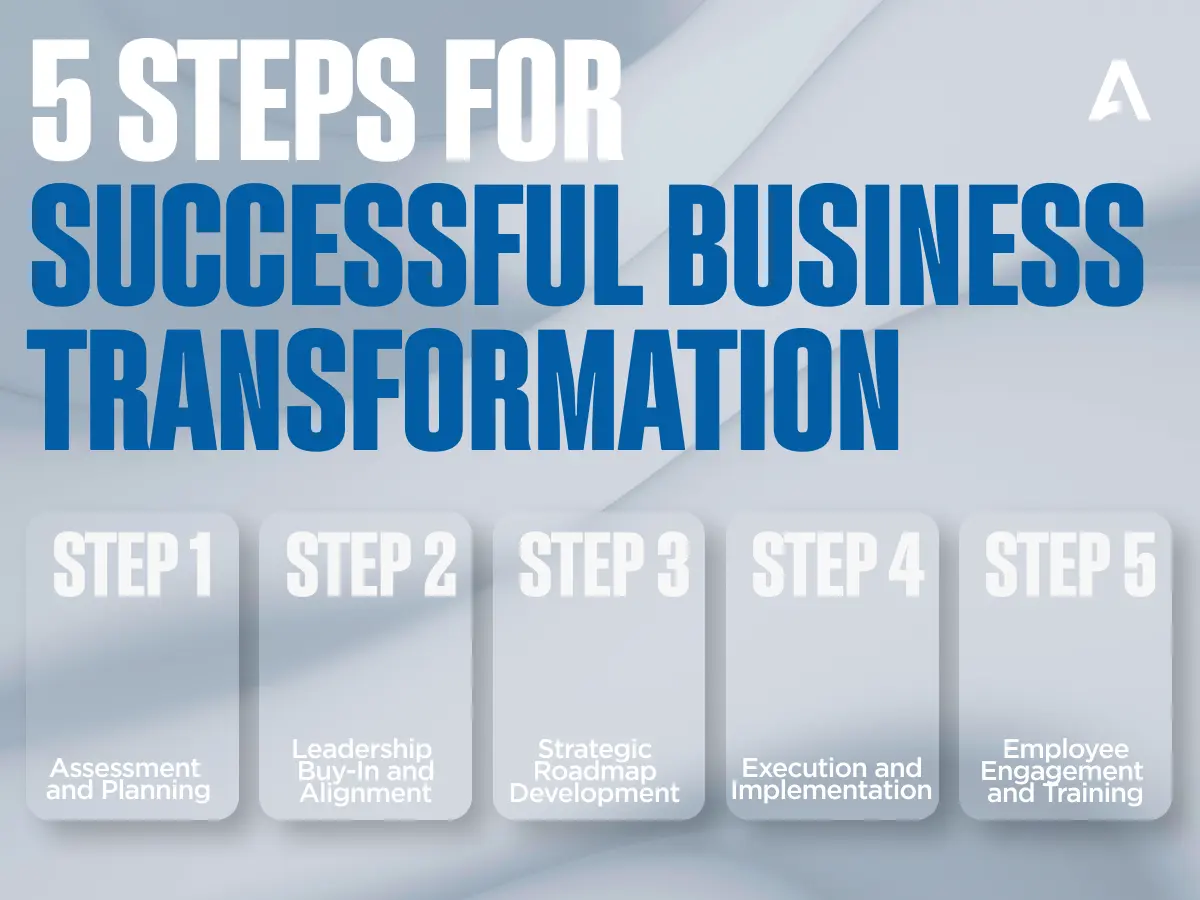
Business Transformation Steps: A Definitive Guide
With global spending on digital transformation services approaching the $2.5 trillion mark, the competition keeps getting tougher.
Re-strategising your business takes more than just minor tweaks in your operations. Instead, you now need comprehensive transformative actions to get ahead of the game.
At Alba Partners, we have the expertise and knowledge to understand that transformation isn’t just about new technology. It’s about modifying your operational structure, culture, and strategy to meet new challenges head-on.
In this guide, we will take you through the essential business transformation steps – a framework similar to the one we use for tackling complex projects.
We draw on our extensive experience to show you the benefits and steps to a streamlined operational workflow. Let’s dive right in.
Key Takeaways
- Your business needs to have the ability to adapt and grow through business transformation if you want to maintain a competitive edge.
- Going through a business transformation process will boost your operational efficiency, resulting in cost savings and sustainable growth.
- Transformation helps your business stay ahead of industry trends, implement changes quicker, and continue to innovate.
- Training your employees throughout the business transformation process is crucial for preparing and motivating them to embrace new methods and technologies.
- If you’re looking to navigate resistance, adapt to new tech, and maintain your momentum during your transformation journey, you will need the help of effective change management strategies.
What is business transformation and why is it important?
Business transformation is not just a buzzword. To show you how it can impact your business, let us tell you what it means for us.
Definition: The business transformation process involves making impactful changes to how the whole of your company operates. Its main goal is to ensure that you can adapt to any market shift that comes your way.
We might be biassed, but we believe that any complex business workflow needs to proactively evolve along with industry changes to remain relevant and competitive.
Whether it be implementing new technologies, entering new markets, or restructuring your operations, business transformation planning is the engine that will lead you to sustainable growth.
Before jumping into our 5 business transformation steps, we want to tell you a bit more about the value we believe you will see throughout and after business transformation.
3 benefits of business transformation
As a business transformation consultancy, some of the main benefits we see through business transformation programs include:
- Enhancing agility and operational efficiency
When you introduce the first business transformation steps to your business, you’ll start by refining workflows that no longer work. You will also start using new technologies that increase your overall productivity.
As a result, the whole company becomes more agile and proactive. Flexibility is one of the keys to succeeding in this competitive world, and business transformation can get you there.
- Driving sustainable growth and long-term resilience
When you implement a robust workflow regarding your business’ response to change, you gain the ability to be sustainable in your growth. Your reactions to economic fluctuations become repeatable and resilient.
Overall, you stand to see fewer downturns and align your business goals with future market trends.
- Proactivity in adapting to market changes
Business transformation doesn’t only help you survive the hard times, it also helps you take advantage of the good times. By being able to implement changes quickly, you can start getting ahead of industry trends.
Maintaining this dynamic approach can help your business consistently improve and lead your industry, ensuring that you remain relevant and competitive in an ever-changing market.

5 steps for successful business transformation
As a boutique business consultancy, we have our own business transformation framework in place. As with any project, we start with assessment and planning, and the rest of the project’s methodology depends on the client’s specific needs.
Today, we’ll tell you about one of our business transformation processes that you can learn from.
1. Assessment and Planning
The first step we take during the business transformation process is an audit or assessment of current operations in your organisation.
From analysing workflows to identifying bottlenecks and finding points of improvement, the assessment step gives us the insights we need to gauge the current state of your business.
To be able to gather data from all levels of your organisation, we essentially become an extension of your team for some time.
Once the assessment step is complete, we begin the planning process. This involves:
- Setting clear and measurable objectives
- Outlining the required resources
- Developing a strategic plan
- Ensuring the plan is in line with your business goals
This is the first business transformation step that sets a solid foundation for implementing effective and focused change.
2. Leadership Buy-In and Alignment
Next up, one of the most important business transformation steps is ensuring that the management is on the same page. This is why we get buy-in from all levels of the organisation.
We truly believe that a successful transformation needs to be backed by strong leadership commitment. So, we communicate the vision and goals of the transformation, explaining the role of every manager and executive throughout the process.
3. Strategic Roadmap Development
Once the leadership is aligned, the next business transformation step is to craft a strategic roadmap. This is essentially a comprehensive plan that includes all the actions to be taken to achieve all the goals set in the first step.
A detailed strategic roadmap should include:
- Specific milestones
- Timelines
- Responsible teams for each task
Additionally, the roadmap should be flexible enough to accommodate potential challenges that come your way.
Overall, the strategic roadmap is there to guide all members of the organisation, tell them what needs to be done, by whom, and by when.
4. Execution and Implementation
Once the roadmap is finalised, it’s time to get to work and execute the roadmap. This includes anything from rolling out new processes and technologies to adopting new systems across the organisation.
Each initiative should have its own KPIs for tracking success.
Effective execution requires strong project management skills and the ability to keep the team focused and motivated throughout the process. That’s why it’s essential to work with a reliable partner who can lead you through a successful business transformation process.
5. Employee Engagement and Training
Last but not least, let’s talk about the main players of the transformation – your employees. After all is said and done, you need to ensure that all your employees are engaged and trained to accept these new technologies introduced to the company.
Comprehensive training programs are in order. Additionally, your management should focus on fostering a culture of open communication, encouraging employees to be active members of the transformation.
This way, they will build a sense of ownership and commitment, which is hugely important for the long-term success of your business transformation process.
Managing change and overcoming challenges
Navigating your business transformation process can challenging, but effective change management can make the process smoother:
- Resistance to Change: Employees may resist new processes. Clear communication about the benefits and involving them in the process can reduce pushback.
- Adapting to New Technologies: Provide thorough training and ongoing support to help employees feel confident with new tools.
- Maintaining Momentum: Keep the team motivated by celebrating small wins and setting clear, achievable goals. Leadership should stay engaged and supportive.
- Managing Complex Projects: Use project management tools and practices to keep multiple projects aligned and on track. Regular reviews ensure issues are promptly addressed.
- Cultural Shifts: Promote a culture of innovation and collaboration by encouraging open dialogue and recognising adaptive behaviours.
By proactively addressing these challenges, businesses can ensure a smoother and more effective transformation.
Conclusion
Business transformation is essential for staying competitive in today’s market. At Alba Partners, we guide you through every step, from assessment and planning to execution and employee engagement. Our approach ensures strong leadership, clear communication, and a supportive environment.
Transformation boosts operational efficiency, sustains growth, and keeps you ahead of market trends. Partner with Alba Partners to redefine your business and secure a successful future. Together, we can turn your transformation vision into reality and ensure your business thrives.
Popular Blogs
- TAIL EVENTS ARE HAPPENING MORE OFTEN – WHITEPAPER BY ACTIVEVIAM & ALBA PARTNERS
- The CxO Guide to Solving Third to Nth-Party Risk Management for Operational Resilience
- Alba Partners x Gieom Partnership Annoucement
- Carbon reduction plan
- A Good Crisis – Analytics, Regulation and Resilience – Alba x Quantifi Whitepaper



